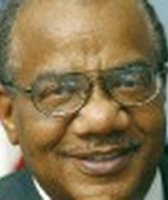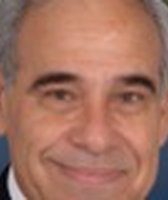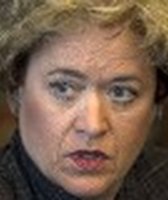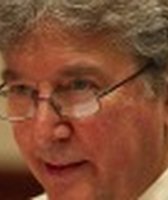Get PolitiFact in your inbox.
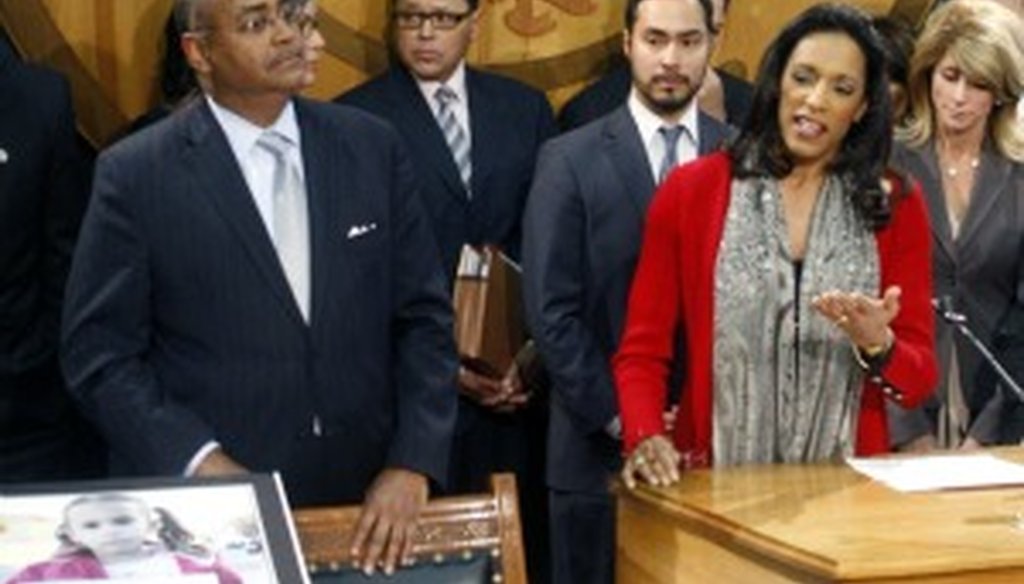
Texas Democratic lawmakers offered their own take on the State of the State after Gov. Rick Perry's speech Tuesday. From left are: Sen. Rodney Ellis, Rep. Jessica Farrar, Sen. Jose Rodriguez, Rep. Joaquin Castro, Rep. Dawnna Dukes and Sen. Wendy Davis.
Responding to GOP Gov. Rick Perry’s State of the State speech Tuesday, Democratic lawmakers sharply criticized the governor for his continuous touting of the Texas economy as a bright light in dire times nationally.
Leading the charge, state Sen. Wendy Davis of Fort Worth drew our attention when she said GOP leaders "are saying our economy is strong even as unemployment skyrocketed in the past two years from 4.3 percent at the beginning of 2008 to 8.3 percent by the end of 2010, even as home sales have declined four straight years, even as Texas has the highest share of minimum-wage workers of any state in the nation, even as Texas has the highest percentage of uninsured, and even as Texas has the most adults who have not earned a high school diploma. These are not signs that our economy is strong."
We haven’t looked into the state’s home sales stats or how Texas adults rank in earning high school diplomas. But her other economy-related statements matched others previously run through the the Texas Truth-O-Meter.
In January, we checked the claim that Texas leads "the nation in the percentage of residents without health insurance," made in a Jan. 6 New York Times column by economist Paul Krugman. True, according to a Gallup poll taken Jan. 2 through June 30, 2010, and survey information collected by the U.S. Census Bureau, which says an average of 25.5 percent of Texans were uninsured in 2007-09.
We investigated Davis’ statement about low-wage jobs last year, rating True a May 4 statement by Linda Chavez-Thompson, then the Democratic nominee for lieutenant governor, that Texas "has the highest share of minimum-wage workers in the nation." According to data from the U.S. Bureau of Labor Statistics, 8.5 percent of the state’s hourly workers earned the minimum wage or lower in 2009. That percentage placed Texas in the No. 1 spot among states.
Turning to the increase in the state’s unemployment rate, we haven’t researched the three-year time period that Davis noted. But in October, we rated Mostly True a statement in a newspaper ad from the anti-Perry Back to Basics political group that "the Texas unemployment rate has even grown more than the nation's as a whole." The group was comparing the change in the rate between February 2009, when Perry wrote a letter accepting federal stimulus money for the state, and August 2010. During that time, the state’s rate rose 1.5 percentage points while the nation’s rate grew 1.4 points. We found, though, that choosing other start dates resulted in the Texas rate changes being the same or less than the increase nationally.
At the Capitol press conference, Davis also mentioned federal stimulus aid, saying that "those in charge" accepted "an excess of $16 billion in stimulus funds … to fund current operational spending." Over the summer, we looked into funding from the American Recovery and Reinvestment Act of 2009 in checking a statement Democratic gubernatorial nominee Bill White made June 25. White said Perry had "accepted more stimulus funds than any other governor except the governors of California and New York."
Mostly True, though we didn't find statistics solely reflecting stimulus dollars that flowed through state governments. However, an April 2009 report estimated that under the Recovery Act’s 40 major grant programs, Texas’ take ($16.3 billion) would place it in third place among states, behind California ($27.1 billion) and New York ($21.7 billion).
Davis also said that "in 2003, those in control balanced the budget on the backs of children by kicking them off health insurance rolls and by deregulating college tuition, sending the cost of a college education soaring and out of reach for many hardworking Texas families."
How the state adjusted to a projected multi-billion dollar revenue shortfall in the 2003 session was a frequent topic during the run-up to this year’s session, especially because lawmakers might make significant spending cuts to balance the 2012-13 budget without raising taxes. Last spring, we rated Barely True Perry’s statement that in 2003, Texas cut "$10 billion out of the entire budget, yet we put $1.8 billion more into public education. We put $800 million more into health and human services."
Indeed, the 2004-05 revenue shortfall was pegged at $10 billion as the 2003 session started. But the budget that Perry signed into law in 2003 did not cut that much spending. About $3.2 billion was cut, while funding for public education and health and human services increased by $893 million and $1.3 billion, respectively. Notably, federal aid fueled the increases, enabling lawmakers to appropriate $1 billion less in state money to public education and $6.8 million less to health and human services.
Davis leveled another criticism for how the 2004-05 budget was written: "Hidden in that budget was a gimmick that’s been used in every budget since, the use of dedicated funds, such as the fees that are collected on every Texans’ electric bills meant to keep power on for those who are struggling, such as vehicle inspection fees that are collected to clean our dirty air. ... $1.3 billion in funds in 2003 that were dedicated for other purposes were used to balance our budget."
She called that "deficit spending in disguise."
In a Nov. 15 speech, state Sen. Kirk Watson, D-Austin, similarly expressed concern about the use of "dedicated" funds to balance the budget. We rated as Mostly True his statement that "more than $3.5 billion in state revenue that is supposed to be dedicated to basic needs and functions is being diverted to make the books look balanced." Watson accurately recapped the money allocated from specific-purpose accounts for the 2010-11 budget. The dollars helped balance the budget; they didn’t just make the books look balanced.
Davis closed out her remarks by saying it’s important to be honest about how tax dollars are spent. Ahem, how about hitting the mark every time in politics and government?
Our Sources
Texas House of Representatives online, press conference, Feb. 8, 2011
See related PolitiFact Texas statements









